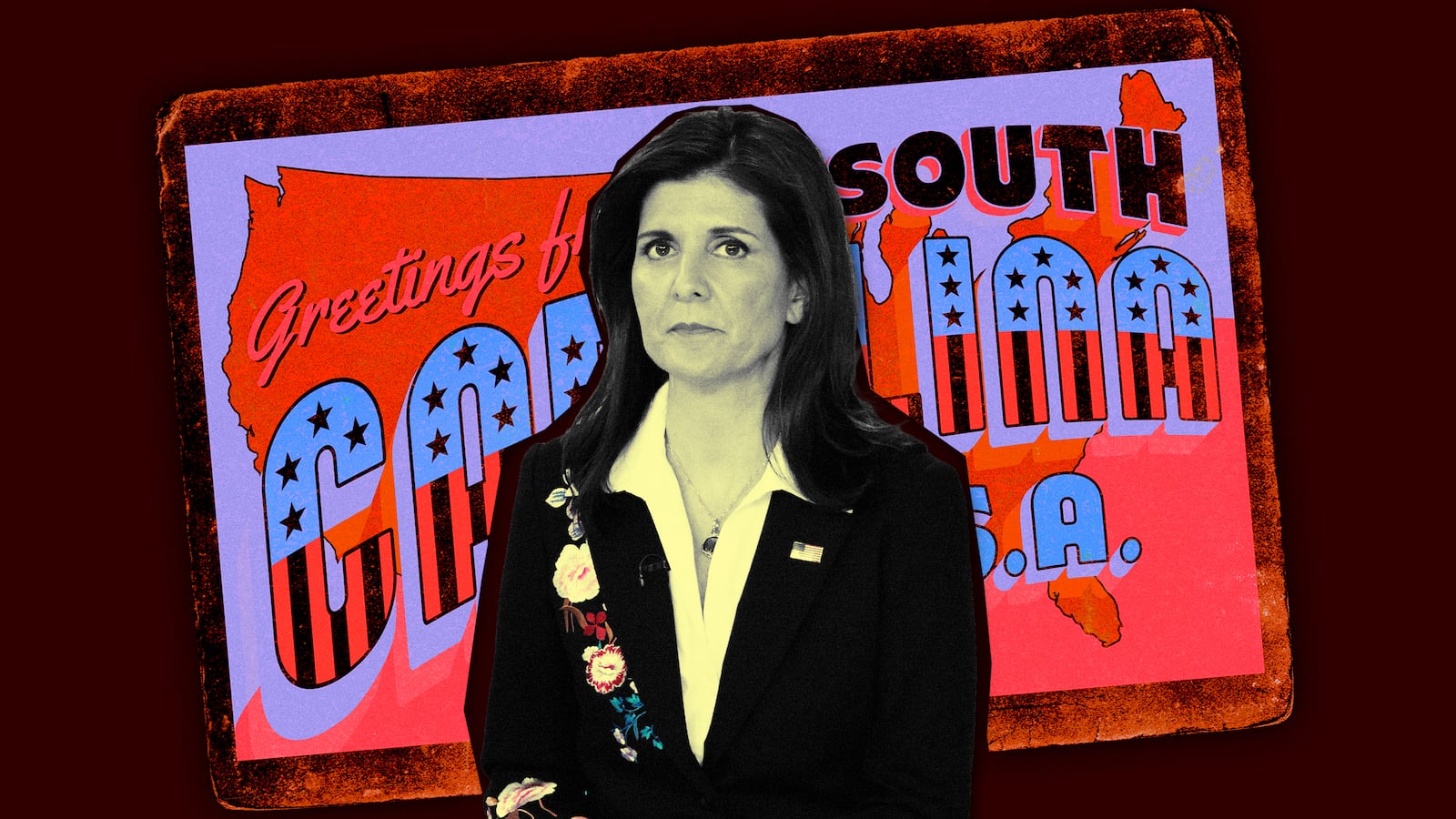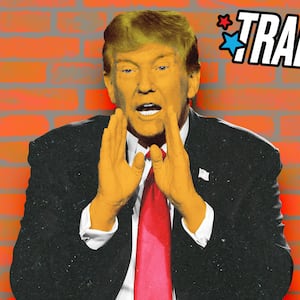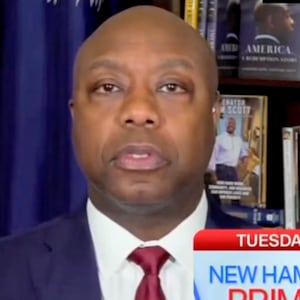When Nikki Haley walked inside the South Carolina state house last January, she found a revolt brewing in the halls.
As she prepared to launch her presidential bid, Haley visited the newly elected freshman class of GOP state lawmakers at the South Carolina capitol.
In her rise from backbencher to two-term governor, Haley built her reputation on picking carefully calculated battles with the state Republican Party’s old guard. Taking on those battles is one of the reasons she turned into a GOP rising star in the pre-Trump era.
But when Haley returned to Columbia, five years removed from her governorship, and long after Donald Trump had taken over her party, she found herself up against a new power center in her home state: the South Carolina Freedom Caucus.
The first state lawmakers anywhere to copy the House Freedom Caucus on Capitol Hill and import their hardline ideology and uncompromising tactics, the South Carolina Freedom Caucus had been thriving ever since Haley left power.
And in response to the group’s willingness to launch primary challenges against fellow Republican lawmakers who they deemed insufficiently conservative, the state’s House GOP leadership instituted a new check on the right-wing insurgency: a loyalty pledge that would prohibit Republicans from criticizing and campaigning against their own.

Primary candidate and former South Carolina governor Nikki Haley speaking to supporters at Doc's Barbeque in Columbia, South Carolina, on Feb. 1, 2024.
Joshua Boucher/The State/Tribune News Service via Getty ImagesThe Freedom Caucus described it as a "Soviet-style” pledge.
During their meeting, the newly formed group of hardliners wanted Haley to come out against the pledge. For the former governor, who shares the same Tea Party roots as many of the Freedom Caucus members, it might have seemed like a layup.
Early in her state house years, Haley spoke out against the legislature’s longstanding culture of holding voice votes that left no record of how members voted. The provision of the loyalty pledge, which banned GOP lawmakers from taking photos of the chamber’s board of roll call votes to weaponize later, was easily comparable.
Those familiar with the meeting told The Daily Beast that Haley said all the right things about why the pledge was a bad idea. But as days and weeks passed afterward, the Freedom Caucus hadn’t heard a peep back about whether she would oppose the pledge. Not even a tweet.
Haley’s silence confirmed the faction’s suspicion—that she would “tell people what they wanna hear in front of them,” a longtime South Carolina Republican familiar with the dynamic told The Daily Beast, then tell a different audience what they wanted to hear.
There’s a world in which the Freedom Caucus could have been a powerful ally for Haley in her duel with Trump for South Carolina’s presidential primary election on Feb. 24. As the last remaining viable challenger to Trump, Haley is hoping that a strong performance in her home state could propel her into Super Tuesday on March 5, when 15 states will hold primary elections.

South Carolina governor Henry McMaster and former President Donald Trump make an appearance on the field at halftime during a South Carolina Gamecocks game at Williams-Brice Stadium on Nov. 25, 2023 in Columbia, South Carolina.
Jacob Kupferman/Getty ImagesInstead, the faction has broken decisively for Trump. Of the 17 current members of the South Carolina Freedom Caucus, all but five have endorsed the former president. None have publicly backed Haley. Meanwhile, public opinion polls of the South Carolina primary find Trump with commanding leads.
In that sense, the hardliners are quite similar to their establishment foes, who have similarly all fallen in line for Trump.
But the tale of how Haley lost her outsider label and rabble rouser cred in South Carolina is a distillation of how she did so nationally, to the point she has been tagged as the “establishment” candidate in the 2024 primary.
It’s not just political positioning. Haley’s pattern of mismanaged relationships—a recurring theme in her political rise—and self-inflicted wounds hurt her standing among the group and its influential network, turning South Carolina from favorable turf into the state that could quash her campaign once and for all.
Ultimately, Haley’s increased estrangement from the right wing vanguard in her home state reflects the biggest problem facing her presidential bid: her struggle to connect with the GOP’s base reshaped in Trump’s image.
“You talk to a redneck up in the upstate of South Carolina,” the longtime South Carolina Republican said, “who’s of simple means, the Tea Party type, ultimately became a Trump voter… It’s her vs. the original Kool-Aid. Trump is simply a proxy for anti-establishment, and they’re like, ‘well, we don’t trust Nikki.’”
Haley shared several common enemies with what eventually became the South Carolina Freedom Caucus in 2022—namely, the state’s chamber of commerce Republicans and lawmakers from the old guard who wanted to keep earmarks in the state budget.
But Republicans familiar with Haley’s tenure in South Carolina said her image declined following her embrace of major corporate employers who she persuaded to relocate to the state. The incentives she promised them, like millions of dollars in tax breaks, were distinctly out of step with the Tea Party turned Freedom Caucus priorities of cutting spending and dismantling the social safety net.
A 2013 analysis from the local newspaper The State estimated Haley racked up $800 million in lost tax revenue just to woo four companies. Although those companies—BMW, Boeing, Bridgestone and Michelin—indeed brought jobs to the state, the tax breaks amounted to around $100,000 for each of the 8,000 created.

Sen. Lindsey Graham speaks about former President Donald Trump during an event at the South Carolina State House on Jan. 28, 2023 in Columbia, South Carolina.
Win McNamee/Getty ImagesFreedom Caucus members are taught to watch what fellow Republicans do, not what they say. And from what they saw, they weren’t impressed with Haley when it came to her final years in office.
“It feels like she walked on them,” the longtime South Carolina Republican said of the rank-and-file legislators during her time as governor, arguing Haley began losing them by “going the corporate route.”
Meanwhile, Trump has consolidated power in South Carolina as effectively as anywhere. His roster of South Carolina endorsements runs wide and deep, starting with South Carolina Gov. Henry McMaster, who endorsed Trump while serving under Haley as lieutenant governor in 2016.
Trump also has both U.S. senators in Lindsey Graham and Tim Scott in his corner—even though Haley appointed Scott to his Senate seat—along with the lieutenant governor, the secretary of state, the attorney general, the state treasurer, five members of Congress, three state senators, and a whopping 42 of the 88 Republicans currently serving in the South Carolina House.
Haley has five state senators and only four state representatives backing her. Rep. Ralph Norman (R-SC) is the lone Haley supporter in all of the House GOP conference.
“You keep hearing, why am I the only one?” Norman said in an interview with The Daily Beast. It’s because she bucked the establishment.”
Norman’s comment captures the Haley campaign’s explanation of why the lack of support from the state Freedom Caucus and Trump’s laundry list of endorsements aren’t a threat for her on home turf.
“It was a different dynamic” when Haley was governor, a campaign official told The Daily Beast. “She was a Tea Party candidate. It was her versus the chamber of commerce and that kind of stuff.” The Freedom Caucus, the Haley official said, is “really not relevant to what we’re doing. Like the people she was fighting against, she was considered the rabble rouser.”
According to South Carolina Republicans with knowledge of Haley’s relationship with the South Carolina GOP conference and the group that later became the Freedom Caucus, they needed much more than a “rabble rouser” when she had power.

A supporter of former President Donald Trump drives a car outside the Indian Land High School ahead of a campaign event of presidential candidate Nikki Haley, in Lancaster, South Carolina, on Feb. 2, 2024.
Shannon Stapleton/Reuters“It all goes down to how one expended political capital,” the longtime South Carolina Republican familiar with the situation said. Another operative in the state said Haley didn’t need to cash in any major favors to earn some loyalty among the Freedom Caucus. She just had to tweet or say in an interview that Republicans don’t need a loyalty pledge to respect each other.
Instead, Haley’s visit to Columbia left the Freedom Caucus members wondering why she wasn’t taking a risk to help them after building her brand on picking fights with the “old boys’ club.”
Norman, for his part, called the loyalty pledge “a dumb thing.”
“That’s the best gift the Freedom Caucus can have,” he said, pointing to the establishment GOP “kicking people out” as playing right into the hardliners’ hands.
Even on occasions where Haley stuck her neck out for fellow South Carolina Republicans as she rose the ranks, they didn’t always return the favor.
For instance, Haley appointing Scott to the Senate failed to pay any dividends in the 2024 primary, when they had a sliver of a chance to unify the party against Trump. Even though Haley reached out to Scott after he dropped out in an effort to court his endorsement, Scott never called Haley to give her a heads up about his decision to endorse Trump, Norman said.
While Norman said he likes Scott “as a person” and considers him “a friend,” he called the decision not to notify Haley “a mistake.”
“He’ll have to explain why he did what he did. It hurt him himself not to at least call her, because he wouldn’t be where he is today unless Nikki had been there” for him, Norman said.
Nate Brand, a spokesperson for Scott, told The Daily Beast there was a heads up given—it just wasn’t a phone call.
“The senator texted Nikki on the day before the endorsement to let her know he’d be making a decision soon,” Brand said.
Despite all those years commanding the halls of the South Carolina State House, Haley has little to show for it in terms of sturdy relationships as she wages her insurgent campaign against Trump.
As Haley would know as well as anyone, both the building and the institution have their ways of keeping the score. Six bronze stars adorn the capitol’s blue granite exterior, commemorating the spots struck by Union General William T. Sherman’s artillery during the Civil War.
A key failing, according to the South Carolina operative, was her inability to build a bench of loyalists in the legislature.
In turn, Haley handed the Freedom Caucus to Trump.
“I keep going back to it, it’s trust,” the first South Carolina Republican said. “She talked a good game at the beginning and does now, but in terms of on the ground in South Carolina, she didn’t spend political capital and she walked away from them when they felt abandoned.”
Reese Gorman contributed reporting for this story.










